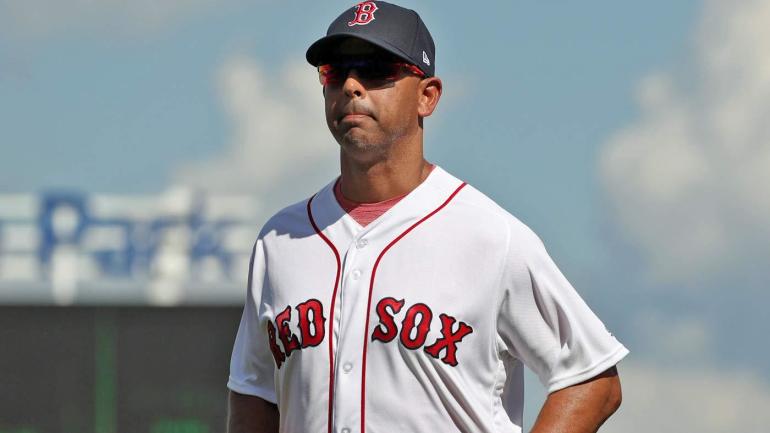
Three unnamed members of the 2018 Red Sox, which won the World Series, admitted that the team used the video replay room to steal signs throughout that season, according to Ken Rosenthal and Evan Drellich of The Athletic on Tuesday.
That season, the Red Sox won 108 games in the regular season prior to going 11-3 in the playoffs -- a run that included a five-game triumph over the Dodgers in the World Series.
Here's what you need to know about the latest wrinkle in the ongoing sign-stealing controversy in MLB.
How was this made possible?
Each dugout area is equipped with a video replay room. The nominal purpose of the video replay room is to review plays on the field so the manager can determine whether a challenge is warranted. However, the unintended consequence is that players and other team personnel have quick and easy access to a multitude of camera angles of the game, including one of the catcher and his signs to the pitcher. Being able to see the signs in such close proximity to the dugout allowed the player or employee watching video to relay the signs to the dugout, which in turn relayed them a runner on second (or sometimes first), who subsequently signaled the incoming pitch to the batter. That's what the Red Sox, per Rosenthal's and Drellich's team sources, did during the course of the 2018 season.
Teams were fully aware this was against the rules
After replay rooms were put into place in 2014, teams didn't need long to figure out the nefarious potential thereof. MLB, it seemed, took a bit longer to figure out what its constituent clubs knew, and that's why it wasn't until before the 2018 season that the league issued a memo flatly declaring that the video replay room may not be used for sign-stealing. The Red Sox's reported activity took place after that memo was sent to teams, so presumably they can't plead ignorance or appeal to technicality as a defense.
This was different from the Astros' alleged sign-stealing methods
The Astros are being probed by MLB for their alleged sign-stealing during the 2017 season, when they won the World Series, and beyond. Their means, however, were more direct than what Boston is reported to have done. Per previous reporting, the Astros had a TV monitor with a feed from a center field camera near the dugout steps. Astros players would try to decode their opponents' signs and then alert hitters if an off-speed pitch was coming by banging on a dugout trash can.
Since the Red Sox's alleged methods involved more layers and more "human element," some may view them as less egregious. At a fundamental level, though, both alleged means depend heavily upon video feeds -- i.e., electronics . That's widely frowned upon, and it's against the rules. In contract, decoding signs via traditional means not involving the use of electronics is not against the rules.
Alex Cora is a common element
Alex Cora was a first-year manager of the Red Sox in 2018, and he came to Boston via Houston, where he served as the Astros' bench coach for the 2017 season. Cora reportedly was central to the Astros' sign-stealing efforts in 2017, and it's no great leap to assume he was aware of the Red Sox's reported sign-stealing during 2018.
MLB will investigate the Red Sox
Here's what MLB said when Rosenthal and Drellich requested comment on what their sources alleged:
"The Commissioner made clear in a September 15, 2017 memorandum to clubs how seriously he would take any future violation of the regulations regarding use of electronic equipment or the inappropriate use of the video replay room. Given these allegations, MLB will commence an investigation into this matter."
The Red Sox have been disciplined before
This predates Cora's time in Boston, but it's still relevant to the matter at hand. The Red Sox and Yankees in September of 2017 were fined for electronically pilfering signs from the opposing catcher. In the Red Sox's case, their sign-stealing involved the use of an Apple Watch to steal and relay signs.
A second offense will likely entail more severe penalties
Here's the relevant part of MLB commissioner Rob Manfred's statement announcing the penalties for the Red Sox and Yankees in September of 2017:
"Moreover, all 30 Clubs have been notified that future violations of this type will be subject to more serious sanctions, including the possible loss of draft picks."
Consider this relevant to both the Red Sox and Astros. A fine is probably going to be the starting point for disciplinary action once MLB issues its final ruling. Teams were put on notice about such behavior late in the fall of 2017, but the behavior reportedly did not cease.
Other shoes may drop
Ever since the Astros story broke, it seemed highly unlikely that the rule-breaking would be tidily confined to one team. The Red Sox allegations are a reminder of that. As the league continues its investigation and as skilled reporters like Rosenthal and Drellich continue digging into this matter, it would hardly surprise if additional teams were looped into this evolving scandal. After all, the Red Sox and Yankees in essence tattled on each other in 2017 to get this particular ball rolling.
There's more to this story
There's much, much more to Rosenthal's and Drellich's story in the The Athletic, including how the Red Sox's methods may or may not have played a role in their postseason success of 2018. Be sure to give it a click and full read.


















